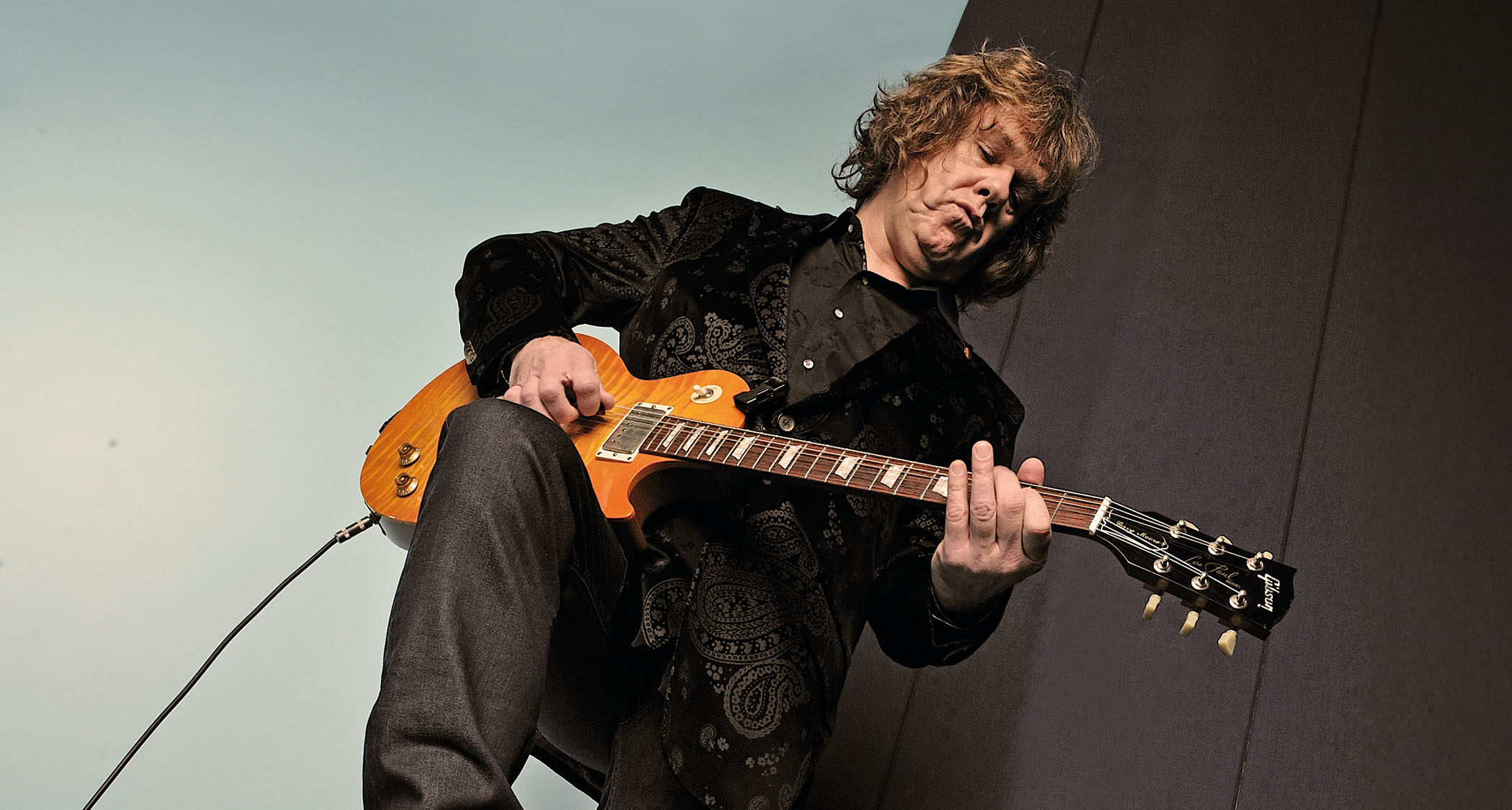Rival Sons’ Scott Holiday on his greatest gear hits and misses: “You can basically install a pair of EMG active pickups into a cardboard box and get the same sound”
Holiday is no fan of active pickups, and his life in gear involves a flaming Line 6 amp, a foolish trade that said goodbye to some PAFs, and the epiphany that TV Jones Filter'Trons are all you ever need

All the latest guitar news, interviews, lessons, reviews, deals and more, direct to your inbox!
You are now subscribed
Your newsletter sign-up was successful
In this instalment of Bought & Sold, it is the turn of Scott Holiday from Long Beach rockers Rival Sons to pull up a chair and discuss the guitars in his life, share a little gear philosophy and confess to the biggest regrets – the guitars that got away, the guitar amps that exploded on him. We have all been there...
And because we often think of Rival Sons as being traditionalists when it comes to their rock sound, it might surprise some to learn which big green delay pedal is a mainstay on his touring pedalboard.
What was the first serious guitar you bought with your own money?
“One of my earliest ones was an Aria Pro II with a Floyd Rose, which played beautifully but didn’t fit my aesthetic as a player – not that I didn’t love guys like Vai and Satriani.
“But I did something terrible. I was in a jazz band in high school and they had an American Strat. It was from a weird year: an ’86 or something, when Strats had two knobs instead of three. And I actually stole it from the school. I could not part with it. I just kinda slipped out the back door, like, ‘I’m just gonna hang onto this guitar forever…’”
What was the last guitar you bought and why?
“I just bought two together. I bought a ’65 Firebird III. It’s a transition, so it’s got a regular headstock instead of reverse, but it’s a reverse body. And then, at the same time, I bought a ’66 330 with the dog-ear P-90s, which is just dead mint. I mean, it is Beatles in a box.”
All the latest guitar news, interviews, lessons, reviews, deals and more, direct to your inbox!
What’s your best guitar-buying tip?
“It depends if you’re buying for investment or playing. They’re two different worlds. If you’re looking for a player, don’t worry about finding the perfect guitar. Personally, if I don’t have a ton of money and want something serious, I’m looking for a refin. I’m looking for something weird because you can get a wonderful guitar with character – and you’re gonna save so much money.”
What’s the most incredible bargain you’ve had when buying guitars?
“I really wanted a Jazzmaster, an old one, and I was waking up every day, going online, clickety-clacking in every dark corner for a deal. I came across a ’62 slab ’board that is kinda strange; it could be a refin, I can’t tell. I think it was maybe $2,300. It had black knobs and had already been very beat-up – but was beautiful.
“I wrote the guy immediately: ‘I want that guitar.’ And he wrote me back saying, ‘I have about 100 messages and you were first!’ I didn’t have the money, even though it was such a good deal, so I just put the whole thing on a credit card. It’s still my greatest steal.”
What’s the strongest case of ‘buyer’s remorse’ that you’ve ever had after buying a guitar or piece of gear?
“I got one of the first Line 6 amps when they went from the bean to the amp. I was playing in this improvisational freakout jazz ensemble and it caught on fire, literally shot flames out the back – which was pretty cool during a gig. We unplugged it quickly and it was done, cooked. I was banished to shaker for the rest of the gig. I don’t know if I was ultimately remorseful because I actually kinda liked that amp. But it did me wrong, man. It did me dirty.”
Have you ever sold a guitar that you now intensely regret letting go of?
“Years ago, I ended up trading a ’67 335 to a local guy. And I traded it for nonsense. I don’t know what I was thinking, but I ended up trading this 335 with original PAFs – that sounded killer and looked beautiful – for a green ’98 Strat and a Les Paul Classic. I don’t even play Les Pauls, and the Classics are, like, whatever. I remember him pulling the pickups out and going, ‘Yep, these are real, you got a deal!’ And I just feel like that was not a smart move.”
Are there any common design features on electric guitars that are an instant turn-off for you when you’re auditioning potential new guitars?
“Active pickups. I’ll even name drop and say those EMG active pickups that metal guys use. I feel like they remove the character from any instrument. You can basically install a pair of EMG active pickups into a cardboard box and get the same sound. And I don’t like that. I think it takes away the organic, living, breathing nature of a guitar.”
When was the last time you stopped to stare in a guitar shop window or browse online and what were you looking at?
“The last time I did that, it wasn’t a shop but a place called the Songbirds Museum in Chattanooga, Tennessee. Holy shit. It’s the most complete guitar collection I’ve ever seen. Like, every colour Firebird from every year. All the doublenecks Gibson ever made. Every Les Paul. Every Tele. Every Strat – and prototypes. Six-figure guitars everywhere. Also, last time I was in Carter’s in Nashville while we were making Darkfighter, they had this beautiful ’64 Firebird VII.”
If forced to make a choice, would you rather buy a really good guitar and a cheap amp – or a cheap guitar and a top-notch amp?
“Probably a good guitar into a cheap amp. Although the from-the-hip answer for me is that anyone worth their salt could make either combination work just fine. Of course, we know that if we put Jeff Beck on any shitty guitar and amp, he sounds like Jeff Beck – rest his soul.”
If you could only use humbuckers or single coils for the rest of your life, which one would you choose and why?
“That’s easy, Filter’Trons! Specifically, I like TV Jones. They’re just particularly full of body and they have plenty of point. But what they also have – that I find a lot of PAF-style humbucking pickups don’t – is a little more air. There’s an airiness to a Filter’Tron and I believe it lets the instruments breathe a little more. There’s a lot of parts, a lot of wood, a lot of craftsmanship in a guitar and if you put in something too aggressive, you don’t get to use all that.”
What’s your favourite guitar shop and why?
“I like Carter’s a lot. Chicago Music is wonderful. Voltage is not there any more in LA, but that was great. In Brooklyn, they have a place called RetroFret that’s unbelievable. And outside of LA, Norm’s Rare Guitars is an amazing shop. He’s just the guy that has sold guitars to everybody, forever.”
Scott Holiday’s live rig
“I have a Roger Mayer Octavia that’s a real mainstay. Deep Trip makes a pedal called the Hellbender, which is their take on a Tone Bender. And I always have a delay I can turn into a slap or long delay.
“Which one? I’m gonna give you an answer that’s less cool than you would think, but just trust me: the original Line 6 DL4. It has, like, 40 billion delays and it does a few things that nothing else does. I’ll use different stuff, but I’ve used that green Line 6 pedal for years.
“Live, I think the Orange Custom [Shop] 50 is a lovely amp. I could say, like, a Tweed or a [black-panel] or a ‘Plexi’. But I’m telling you, that Custom 50 really does the job. For guitars, I use my blue ’99 Firebird quite relentlessly. I had the pickups rewired by a guy named Tom Short and that guitar is a real Swiss Army knife for me.”
- Darkfighter is out now via Atlantic.
Henry Yates is a freelance journalist who has written about music for titles including The Guardian, Telegraph, NME, Classic Rock, Guitarist, Total Guitar and Metal Hammer. He is the author of Walter Trout's official biography, Rescued From Reality, a talking head on Times Radio and an interviewer who has spoken to Brian May, Jimmy Page, Ozzy Osbourne, Ronnie Wood, Dave Grohl and many more. As a guitarist with three decades' experience, he mostly plays a Fender Telecaster and Gibson Les Paul.

